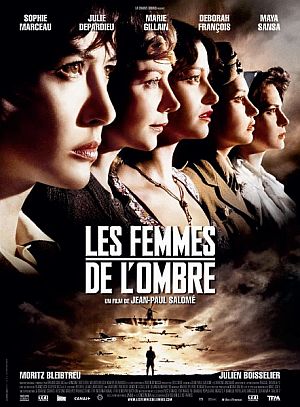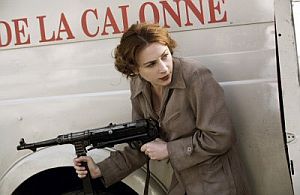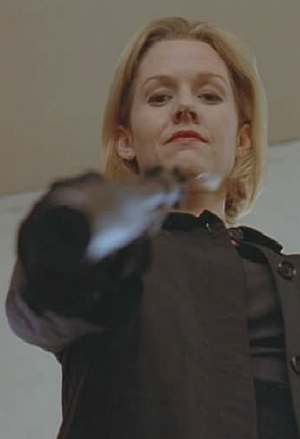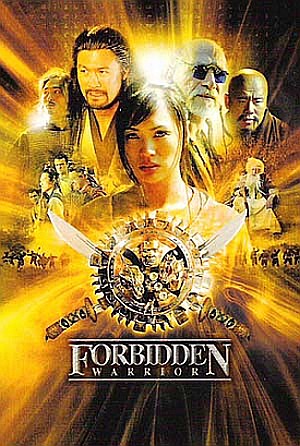 ★★★★★
★★★★★
“The Smell of Female”
“Ladies and Gentlemen, welcome to Violence. The word and the act. While violence cloaks itself in a plethora of disguises, its favourite mantle still remains – sex. Violence devours all it touches, its voracious appetite rarely fulfilled. Yet violence doesn’t only destroy. It creates and moulds as well. Let’s examine closely then this dangerously evil creation, this new breed encased and contained within the supple skin of woman. The softness is there, the unmistakeable smell of female. the surface shiny and silken. The body yielding yet wanton. But a word of caution: handle with care and don’t drop your guard. This rapacious new breed prowls both alone and in packs. Operating at any level, at any time, anywhere and with anybody. Who are they? One might be your secretary, your doctor’s receptionist, or a dancer in a go-go club!”

 Made more than forty years ago, Faster was decades ahead of its time – which may explain why it was such a resounding flop on initial release. But in his autobiography, John Waters called it, “The best movie ever made, and possibly better than any movie that will ever be made,” and helped resurrect it: Rob Zombie is another big fan, and introduced its recent screening on – of all places! – Turner Classic Movies. For this is the kind of film, hell, the kind of title, Quentin Tarantino wishes in his wet dreams he could create. And yet, it’s also an interesting example of censorship as artistically productive: probably the tamest of Meyer’s films: subsequently (and, often, before) they would contain a great deal more explicit nudity. But very rarely did he ever come close to the same artistic heights.
Made more than forty years ago, Faster was decades ahead of its time – which may explain why it was such a resounding flop on initial release. But in his autobiography, John Waters called it, “The best movie ever made, and possibly better than any movie that will ever be made,” and helped resurrect it: Rob Zombie is another big fan, and introduced its recent screening on – of all places! – Turner Classic Movies. For this is the kind of film, hell, the kind of title, Quentin Tarantino wishes in his wet dreams he could create. And yet, it’s also an interesting example of censorship as artistically productive: probably the tamest of Meyer’s films: subsequently (and, often, before) they would contain a great deal more explicit nudity. But very rarely did he ever come close to the same artistic heights.
It tells the story of three girls: go-go dancers, hot-rod racers and outlaws, led by Varla (Satana). One afternoon, their chilling in the desert is rudely interrupted by Tommy and Linda (Bernard, who’d become a Playboy centerfold in 1966), a “square” couple who also have a car. After racing against them, Tommy and Varla get into a fight, which ends with Varla snapping his back. The trio kidnap Linda, and drive off. Stopping to get gas, they hear from the attendant about a crippled old man, who lives with his two sons, and is rumoured to have a fortune as the result of an accident. The girls decide to pay him a visit, and relieve him of his money – only to find out that he may be even more twisted and sadistic than they are…
Where to start? What about with the dialogue, which is prime, ripe and firm as last year’s Gouda, even if Satana has a slightly-irritating tendency to belt out every line at the top of her lungs. But as Rosie (Haji) says, “Honey, we don’t like nothin’ soft! Everything we touch is hard!” – these broads are “like a velvet glove, cast in iron,” as another memorable line reports. Or, as Varla puts it, “I never try anything. I just do it.” Almost every line has a sneer attached to it, and while none of the actresses went on to do anything else of real significance, they are all perfect here. They’re obviously playing characters, but their characters are also playing characters, so it all ties together with either remarkable happenstance, or artistic genius.
 Often neglected are the male contributors, in particular Stuart Lancaster as the target of their scheme. Though confined to a wheelchair, he rules his twisted clan with a rod of iron; in many ways, this is an ancestor of the family from Texas Chainsaw Massacre, with ‘the vegetable’ – as even his own father refers to him – a kinder, gentler version of Leatherface. Seeing the old man slobbering over Linda certainly shifts the audience, and helps to turn the murderous Varla and the other girls from villains into heroines, even as they progress their plan of robbery, because you sense their fate could end up being worse than death.
Often neglected are the male contributors, in particular Stuart Lancaster as the target of their scheme. Though confined to a wheelchair, he rules his twisted clan with a rod of iron; in many ways, this is an ancestor of the family from Texas Chainsaw Massacre, with ‘the vegetable’ – as even his own father refers to him – a kinder, gentler version of Leatherface. Seeing the old man slobbering over Linda certainly shifts the audience, and helps to turn the murderous Varla and the other girls from villains into heroines, even as they progress their plan of robbery, because you sense their fate could end up being worse than death.
Rarely have all the aspects of a film come together with such perfection: it’s like throwing a dozen die and watching them all come up sixes. The editing; the script; the casting; the performances; the theme-tune alone is one of the best of the decade, and all the music helps drive the film along at a relentless pace. You could argue that it’s all idiotically unrealistic, and I would be hard-pushed to disagree. But I would, however, counter that this is much of the film’s appeal: it takes place in an alternate universe ruled by large-breasted, leather-clad, superwomen. Speaking personally, that may not be somewhere I’d want to live, but boy, it sounds like a fun place to visit. :-)
A militant feminist a decade before feminism was popular, Varla is also among the first openly bisexual women in cinema history, and the film is remarkably unjudgemental about the sexuality of any of the women. This helps explain why the movie’s cult appeal crosses so many boundaries, from the gay community to hardcore punk. And though they’re nothing to raise eyebrows today, Satana also used martial arts when they were almost unheard of in Hollywood. It’s sardonic, trailer-trash chic from an era that had yet to grasp fully the entertainment value of such irony. Others would aim at the same targets subsequently, mixing sex with violence in various ratios (Barbarella, Danger: Diabolik, The Perils of Gwendoline), but even now, few have come closer to capturing the heady, hyper-kinetic approach of Meyer’s finest work.
Dir: Russ Meyer
Stars: Tura Satana, Lori Williams, Haji, Sue Bernard
 It isn’t terribly ahead of its time, but one senses this could have done better later in the career of leading lady Mihara – she’d go on to movies such as the unforgettably-titled School of the Holy Beast. Here, however, exploitation largely stops at the title, with no sex to speak off [a cutaway to a gramophone needle is as salacious as it gets], female flesh is strictly limited to underwear, and the violence consists of bloodless gun-battles and a plethora of backhand slaps. With admirable equality, these are administered both to the square-jawed Japanese office hero, Lt. Suguwa (Sugawara), and the dozen women on whose ship he ends up, as World War II winds towards its end.
It isn’t terribly ahead of its time, but one senses this could have done better later in the career of leading lady Mihara – she’d go on to movies such as the unforgettably-titled School of the Holy Beast. Here, however, exploitation largely stops at the title, with no sex to speak off [a cutaway to a gramophone needle is as salacious as it gets], female flesh is strictly limited to underwear, and the violence consists of bloodless gun-battles and a plethora of backhand slaps. With admirable equality, these are administered both to the square-jawed Japanese office hero, Lt. Suguwa (Sugawara), and the dozen women on whose ship he ends up, as World War II winds towards its end.




 ★★★★
★★★★ Mark (Lemaire), is a thief on the run from his collaborators after absconding with the loot. He takes refuge in a remote country manor, all but surrounded by water, which he believes to be deserted. Turns out he was almost right. The sole inhabitants are a pair of chambermaids, Eva (Lahaie) and Elizabeth (Mai), but despite his gun, they don’t seem quite as terrified of the intruder as one feels they should be, and tell him they are expecting some other female visitors later that evening. Elizabeth does take a shine to Mark, and tells him he should leave, but Eva uses her wiles to keep Mark there. The rest of his gang show up, and lay siege to the house, but Eva takes the loot out to them and single-handedly dispatches them, before returning to the manor. As night descends, the visitors finally arrive, and the noose tightens around Mark’s neck, as the truth about the get-together is revealed…
Mark (Lemaire), is a thief on the run from his collaborators after absconding with the loot. He takes refuge in a remote country manor, all but surrounded by water, which he believes to be deserted. Turns out he was almost right. The sole inhabitants are a pair of chambermaids, Eva (Lahaie) and Elizabeth (Mai), but despite his gun, they don’t seem quite as terrified of the intruder as one feels they should be, and tell him they are expecting some other female visitors later that evening. Elizabeth does take a shine to Mark, and tells him he should leave, but Eva uses her wiles to keep Mark there. The rest of his gang show up, and lay siege to the house, but Eva takes the loot out to them and single-handedly dispatches them, before returning to the manor. As night descends, the visitors finally arrive, and the noose tightens around Mark’s neck, as the truth about the get-together is revealed… Watching porn stars try to act is often a painful experience, but renowned 70’s XXX starlet Lahaie is perfectly cast here. She plays a feral creature, driven entirely by instinct, and with no qualms about using sex or violence to achieve her aim, of keeping Mark in the house for the night. The sight of her stalking across the bridge which forms the castle’s sole entrance, wielding a blood-stained scythe almost the same size as the actress, is one that will stick with you. The film does betray its cheapness with some fairly crappy effects [you’re going to have someone hacked apart with a scythe, you should do better than some red gunk on the throat], but more than makes up for it with a parade of strong, confident and sensual female characters. Mark is by no means an idiot or a weakling, but from the moment he arrives in the house, it’s clear he’s completely beyond his depth, out-maneouvered at every turn by the women.
Watching porn stars try to act is often a painful experience, but renowned 70’s XXX starlet Lahaie is perfectly cast here. She plays a feral creature, driven entirely by instinct, and with no qualms about using sex or violence to achieve her aim, of keeping Mark in the house for the night. The sight of her stalking across the bridge which forms the castle’s sole entrance, wielding a blood-stained scythe almost the same size as the actress, is one that will stick with you. The film does betray its cheapness with some fairly crappy effects [you’re going to have someone hacked apart with a scythe, you should do better than some red gunk on the throat], but more than makes up for it with a parade of strong, confident and sensual female characters. Mark is by no means an idiot or a weakling, but from the moment he arrives in the house, it’s clear he’s completely beyond his depth, out-maneouvered at every turn by the women.
 It’s a solid piece of action/drama, which managed to keep both of us awake, despite a session earlier in the evening at the “all you can eat” fish fry; normally, that requires 30,000 Volts to keep us from sliding into post-gluttony unconsciousness. I think Chris enjoyed the movie a little more: I was somewhat on the fence about giving it the seal, finding some of the plotting a little convoluted and occasionally implausible, but her endorsement of this as “great” provided sufficient impetus. Marceau is particularly good, exuding steely resolve to hold the team together, and Bleibtreu makes an excellent foil, coming across as equally smart and committed as Louise. Their conflict is the glue that binds the story together, and makes it one of the best efforts in the wartime heroine genre to date.
It’s a solid piece of action/drama, which managed to keep both of us awake, despite a session earlier in the evening at the “all you can eat” fish fry; normally, that requires 30,000 Volts to keep us from sliding into post-gluttony unconsciousness. I think Chris enjoyed the movie a little more: I was somewhat on the fence about giving it the seal, finding some of the plotting a little convoluted and occasionally implausible, but her endorsement of this as “great” provided sufficient impetus. Marceau is particularly good, exuding steely resolve to hold the team together, and Bleibtreu makes an excellent foil, coming across as equally smart and committed as Louise. Their conflict is the glue that binds the story together, and makes it one of the best efforts in the wartime heroine genre to date. Ward (whom we’ll watch in anything, as payment for the enjoyment Tremors has given us) plays John McWhirter, a hard-bitten journalist with a fondness for the bottle, who is still trying to put behind him an incident when he was a young radical, that led to his friends being sent to jail for long terms, while John escaped doing time. He’s looking into the murder of an industrialist by Palestinian terrorists, when said friends show up, asking him to hide a woman (Ticotin) from the authorities for a few days, describing her as an activist in Shining Path, a Peruvian rebel group. Turns out she’s not who she seems, and it also turns out John had more to do with his friends’ arrests, thirty years ago, than it initially appeared. With enemies in the FBI, led by Robert Lecker (Plummer), an ally in the CIA, and a female assassin (Miller, right) out to tidy up all the loose ends, McWhirter has to decide whether to do what’s right, what’s easy, or what’s best for himself – and those might be three mutually exclusive options.
Ward (whom we’ll watch in anything, as payment for the enjoyment Tremors has given us) plays John McWhirter, a hard-bitten journalist with a fondness for the bottle, who is still trying to put behind him an incident when he was a young radical, that led to his friends being sent to jail for long terms, while John escaped doing time. He’s looking into the murder of an industrialist by Palestinian terrorists, when said friends show up, asking him to hide a woman (Ticotin) from the authorities for a few days, describing her as an activist in Shining Path, a Peruvian rebel group. Turns out she’s not who she seems, and it also turns out John had more to do with his friends’ arrests, thirty years ago, than it initially appeared. With enemies in the FBI, led by Robert Lecker (Plummer), an ally in the CIA, and a female assassin (Miller, right) out to tidy up all the loose ends, McWhirter has to decide whether to do what’s right, what’s easy, or what’s best for himself – and those might be three mutually exclusive options. Certainly one of a kind, this coming-of-age film tells the story of Aicha (Turan), a Muslim girl born of Turkish parents, who is obsessed with learning martial arts – the last thing her father wants. This thoroughly unfeminine interest, in the eyes of her community, is carried out in secret, but Omar (Banissi), a friend of her brother’s fiancee’s family finds out, and is thoroughly unimpressed. “I don’t fight girls,” he says dismissively, when ordered to spar with Aicha, and this leads to his ejection from the club by their teacher (Xian). When he confronts Aicha at the engagement party, the resulting argument becomes a brawl, and leads to the breaking off of the engagement – which is doubly unfortunate, as the bride-to-be is discovered to be pregnant. Meanwhile, Aicha has to prepare for an upcoming tournament, alongside her training partner, Emil (Melville) – and for which Omar has also signed up as a contestant.
Certainly one of a kind, this coming-of-age film tells the story of Aicha (Turan), a Muslim girl born of Turkish parents, who is obsessed with learning martial arts – the last thing her father wants. This thoroughly unfeminine interest, in the eyes of her community, is carried out in secret, but Omar (Banissi), a friend of her brother’s fiancee’s family finds out, and is thoroughly unimpressed. “I don’t fight girls,” he says dismissively, when ordered to spar with Aicha, and this leads to his ejection from the club by their teacher (Xian). When he confronts Aicha at the engagement party, the resulting argument becomes a brawl, and leads to the breaking off of the engagement – which is doubly unfortunate, as the bride-to-be is discovered to be pregnant. Meanwhile, Aicha has to prepare for an upcoming tournament, alongside her training partner, Emil (Melville) – and for which Omar has also signed up as a contestant. Michael Dublin (Ortis) is a wheeler-dealer, swinging between fixing underground fights and selling dodgy auto parts as need and opportunity arises. When the latter goes wrong, causing the car to explode rather than go faster, he is rescued from a beating by Katherine Parker (Neuenswander), a girl who easily disposes of the attackers, giving Dublin an idea. Instead of rigging the bets by getting good fighters to take a dive, what about winning with someone like Kat, who can win straight-up, but on whom no sane gambler would ever wager? Initially, things go as planned, despite her qualms about being labelled “Kid Vixen”. But Dublin’s reputation precedes him, and he is requested by Richter (Hanover), who runs the underground ring, for his fighter to lose a bout. Ok, “requested” might be the wrong word there. However, Kat is having none of it, leaving her manager with a very difficult choice to make, and choices have consequences.
Michael Dublin (Ortis) is a wheeler-dealer, swinging between fixing underground fights and selling dodgy auto parts as need and opportunity arises. When the latter goes wrong, causing the car to explode rather than go faster, he is rescued from a beating by Katherine Parker (Neuenswander), a girl who easily disposes of the attackers, giving Dublin an idea. Instead of rigging the bets by getting good fighters to take a dive, what about winning with someone like Kat, who can win straight-up, but on whom no sane gambler would ever wager? Initially, things go as planned, despite her qualms about being labelled “Kid Vixen”. But Dublin’s reputation precedes him, and he is requested by Richter (Hanover), who runs the underground ring, for his fighter to lose a bout. Ok, “requested” might be the wrong word there. However, Kat is having none of it, leaving her manager with a very difficult choice to make, and choices have consequences. Though I couldn’t put my finger on why, large chunks of this seemed very familiar when I was watching it last night. Maybe it was just the story, cut from a template [mystical book, blah, chosen one, blah-blah, key to all power, etc.] we’ve seen a million times before. But then, when I Googled the film’s title, I realised why: at #6 was
Though I couldn’t put my finger on why, large chunks of this seemed very familiar when I was watching it last night. Maybe it was just the story, cut from a template [mystical book, blah, chosen one, blah-blah, key to all power, etc.] we’ve seen a million times before. But then, when I Googled the film’s title, I realised why: at #6 was  While not the first film to give D’Artagnan a daughter – the fairly self-explanatory D’Artagnan’s Daughter got there a decade before, with Sophie Marceau in the role – this is still entertaining enough, though at 171 minutes, probably too long. Valentine (Amy) heads to Paris to join the King’s guards, only to find herself framed for murder after coming into possession of a letter that could bring down the monarch. Fortunately, the other Musketeers also had children who followed in their father’s footsteps, so she has help as she tries to thwart the evil plans of Cardinal Mazarin (Depardieu) and his henchman Villeroi (Pirae).
While not the first film to give D’Artagnan a daughter – the fairly self-explanatory D’Artagnan’s Daughter got there a decade before, with Sophie Marceau in the role – this is still entertaining enough, though at 171 minutes, probably too long. Valentine (Amy) heads to Paris to join the King’s guards, only to find herself framed for murder after coming into possession of a letter that could bring down the monarch. Fortunately, the other Musketeers also had children who followed in their father’s footsteps, so she has help as she tries to thwart the evil plans of Cardinal Mazarin (Depardieu) and his henchman Villeroi (Pirae). Why let Kei and Yuri blow up one case, when you can save time by giving them two at once? That’s what happens at the start of this, as the WWWA computer assigns them two, apparently unrelated, assignments in the same galactic sector: one is to investigate a spaceship which blew up, and the other involves the disappearance of a scientist and his family. You will not be surprised to hear that these two cases are interconnected, though it does appear to come as a shock to the participants here. Once they reach their destination, it soon becomes clear that someone is out to stop Kei and Yuri – “someone serious,” to steal a line from Leon. Can they uncover the conspiracy before it uncovers them?
Why let Kei and Yuri blow up one case, when you can save time by giving them two at once? That’s what happens at the start of this, as the WWWA computer assigns them two, apparently unrelated, assignments in the same galactic sector: one is to investigate a spaceship which blew up, and the other involves the disappearance of a scientist and his family. You will not be surprised to hear that these two cases are interconnected, though it does appear to come as a shock to the participants here. Once they reach their destination, it soon becomes clear that someone is out to stop Kei and Yuri – “someone serious,” to steal a line from Leon. Can they uncover the conspiracy before it uncovers them?

 Often neglected are the male contributors, in particular Stuart Lancaster as the target of their scheme. Though confined to a wheelchair, he rules his twisted clan with a rod of iron; in many ways, this is an ancestor of the family from Texas Chainsaw Massacre, with ‘the vegetable’ – as even his own father refers to him – a kinder, gentler version of Leatherface. Seeing the old man slobbering over Linda certainly shifts the audience, and helps to turn the murderous Varla and the other girls from villains into heroines, even as they progress their plan of robbery, because you sense their fate could end up being worse than death.
Often neglected are the male contributors, in particular Stuart Lancaster as the target of their scheme. Though confined to a wheelchair, he rules his twisted clan with a rod of iron; in many ways, this is an ancestor of the family from Texas Chainsaw Massacre, with ‘the vegetable’ – as even his own father refers to him – a kinder, gentler version of Leatherface. Seeing the old man slobbering over Linda certainly shifts the audience, and helps to turn the murderous Varla and the other girls from villains into heroines, even as they progress their plan of robbery, because you sense their fate could end up being worse than death.